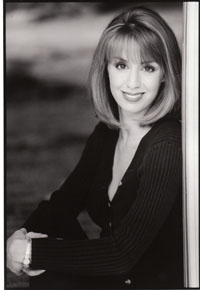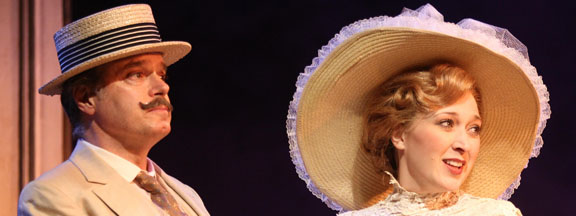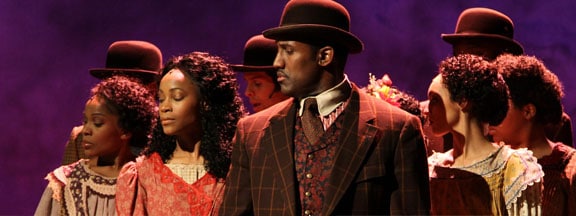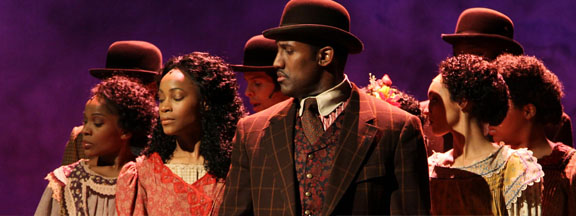Complete creative control. That’s the mouth-watering carrot Chicago’s Drury Lane Theatre is dangling before its directors this season. Each will get to choose not only the show they want to do, but the design team they need to help them realize their vision, the cast they feel can best convey the story’s spirit, even the costumes they’ll be wearing while they do it. Rachel Rockwell’s revival of “Ragtime,” playing now through May 23, 2010, launched the series to worshipful reviews. On the morning of its very first preview, Rockwell took some time to talk to Performance Space about Drury Lane, The Year of the Director, and the show she’s been dying to get her hands on.

Performance Space: Rachel, you’re so close to opening, so I’ll try to be brief. Could you start by giving me a little background on your history with the Drury Lane, how you work with them, and what it is that keeps you coming back there?
Rachel Rockwell: I think my first show with them as an actor was in the mid-90s. But I only did two shows there as an actor; then I was gone for a lot of years on tour. I came back five years ago and choreographed “The King and I” for Bill Osetek, who is the current artistic director, and it was a great experience. It was really the beginning of what I’m calling the renaissance of Drury Lane.
PS: Everyone seems to be using that phrase.
RR: I don’t know any better way to describe it. Everything is changing there, all the production values, the artistic approach, the creative intent, the product. I directed “Miss Saigon” last year. It was the first Main Stage show that I’d directed for them – I had directed children’s theater – and I feel like that was a huge step forward in terms of doing a show that was large in subject matter and in scale. We thought “Miss Saigon” was big until we met “Ragtime.”
PS: What does it mean to you to have “Ragtime” be part of The Year of the Director at the Drury Lane?
RR: I’m just really grateful that they asked me to be a part of that… and to get to do a show like “Ragtime” that I’ve always wanted to do since the days of…
PS: Brian Stokes Mitchell, Audra McDonald and Marin Mazzie? I’d seen that production years ago and it was just incredible.
RR: It was incredible. My husband worked on that, actually, from the first workshop [as a member of the audio team]. So I feel like I’ve been around “Ragtime,” at least peripherally, for a decade. And I’ve been dying to get my hands on it.
PS: What can you share with us about your approach? What is your journey with the show going to be?
RR: Well, I don’t think that the story could be more timely than it is right now. I think it’s even more pertinent than it was 10 years ago given the election of Barack Obama and all of the things, both positive and negative, that that has awakened within the country. It’s really cyclical, and you look at it and you think wow, we have made such incredible strides and we’ve also made such minimal strides.
PS: The Tea Party movement, for example?
RR: Exactly. I think it will be heartening and also shocking to people how similar these characters’ struggles are to our own, still, over a century later. For me, it was about finding the personal stories within this epic structure, because it’s huge but it also irises down to very, very small moments. And the humanity of the characters is what unites them, which is what unites us all in this country. When you take away baggage and religion and materialism, we’re really all just people. I find it challenging to get to the heart of each of these character’s stories within the grand nature of this play and the epic score. You want to be able to appreciate the landscape, but you also want to be able to appreciate one flower growing on that huge landscape. I don’t know that that’s necessarily a unique approach; it’s trying to tell the story the clearest, most effective way possible. Also, while the show that we’re doing is grand in scale in terms of production values, it all wants to move really rapidly. So the flow of the show is critical to me, and also not gumming it up with extra stuff because I don’t want people to fall more in love with the stuff than the stories that they’re listening to. We’ve done this in a relatively minimal way – it’s just that people don’t understand how complicated minimal is. To do something really simple and seamless that flows really well and put one piece or two pieces of something on the stage gives those pieces greater significance because they have to be the perfect pieces. It’s when you have a fully realized, literal set that you can afford to be not as particular with every single detail because there’s a lot for your eye to look at. But when you’re looking at a lot of negative space, the positive things have to be perfect, so that’s been really challenging.
PS: And there’s so much invested. Isn’t this the biggest production the Drury Lane has ever done?
RR: Without question.
PS: So, no pressure, right?
RR: Yeah, no kidding. There’s expectation here but, really, let’s just tell the story, let’s just do this like we would do any other production, and it will all be great. You can’t get too bogged down in the expectation because, quite frankly, I would do the play this way whether we had the set or not. This would be the approach I would take whether we had a beautiful bridge, which I am in love with, or not.
PS: Speaking of which, is the bridge working? (The 46-foot swinging bridge had been uncooperative at an earlier rehearsal.)
RR: Yeah, the bridge is working. That was a bit frustrating for a minute. But you know whenever there’s a machine you’ve got to be prepared for that. But now everything is working perfectly well.
PS: Do you have the Model T? (Coalhouse Walker’s automobile, which is pivotal to the play.)
RR: We do, and it’s really beautiful. I feel like that piece in particular makes the struggle for the audience to stick with the Coalhouse character greater because they feel a sense of loss as well. It becomes personal. They understand it in terms of status and material possessions, and I think it makes the struggle greater for the audience.
PS: How important was it to you to cast Quentin Earl Darrington, who played Coalhouse Walker in the most recent Broadway production?
RR: The search for Coalhouse Walker was about as epic as the play.
PS: He was your Scarlett O’Hara.
RR: That role requires such a specific and big skill set. There are so few men that I found who could really do that character justice, and Quentin was the guy. Apart from being phenomenal in the show, he’s one of the nicest human beings I’ve ever met, which makes the working process so amazing. He could not be lovelier and I think he’s just going to blow the roof off the place.
PS: So your first preview is tonight [Thursday, March 18th]?
RR: Our opening press night is next Wednesday [March 24th]. I have some previews here to get the play back from the technical process and start to re-explore the material, because during tech it really does become about standing for lights and moving to the next transition, and you kind of lose your play for a few days.
PS: But it’s taken shape and you’re comfortable and confident with where it is?
RR: Yeah, I don’t know if you’re ever confident, but I feel really positive about where we are. I think we are exactly where we should be at this point, and I know that the learning curve for the few previews that we have is really great. We’ll be able to get this back under our control. And I don’t think this play will ever stop growing, quite frankly. There’s too much to discover about this material to ever say that we’re done. We won’t be able to rehearse, but the actors will be able to find new things as they listen to the audience inform them. It’s so rich that you could just continue to make choices about it forever.
PS: What’s next for you after “Ragtime,” or is it too soon to say?
RR: I start another show at Drury Lane on Monday.
PS: Wait, what’s your other show?
RR: “High School Musical.” [The production is presented by the Drury Lane Children’s Theatre.] You know, “Ragtime,” “High School Musical”…
PS: I see the connection!
RR: And then I’ve got a bunch of other stuff coming up. I’ll be doing the children’s piece at Chicago Shakespeare Theater on Navy Pier this summer [as director of the Chicago Shakespeare Theater Family world premiere of a musical version of “The Emperor’s New Clothes”]. I’m very fortunate I have work. I’m very blessed. We keep joking, couldn’t you just do a small comedy at Drury Lane instead of these epic, huge, hard pieces? If we can find one we can all get behind, I’m all for it!
PS: Well, I love the contrast of “Ragtime” and “High School Musical.” I think that’s perfect.
RR: Yeah, it’s kind of funny.
PS: So, of course, you’ll be looking for the social relevance in “High School Musical.”
RR: Absolutely. And you know, it’s kind of there. According to my 5 year old, it’s the greatest piece of theater ever and she can’t wait for me to do it again.



